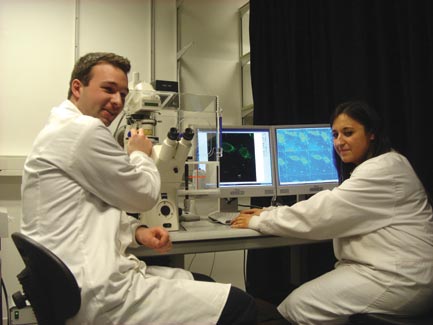| 2006 |

|
YEAR BOOK |
Trinity College Dublin
|
Postgraduate training opportunities in cellular physiology
|

The MSc in Mammalian Cell Physiology is a one-year, full-time course open to graduates of biology-related subjects, medicine, pharmacy or veterinary medicine. The course also appeals to graduates in engineering or chemistry who wish to gain experience in Physiology in order to apply knowledge gained during their primary degrees to a biological area. Such interdisciplinarity is key to the development of novel research initiatives within the academic or industrial sectors. This MSc course provides a solid basis of understanding in cell physiology and the techniques that are used to investigate cell function. A strong empthasis is placed on developing transferable skills such as data handling, communication skills and critical thinking. While the first two terms are composed of lectures, workshops, and laboratory classes, a substantial component of the course is an individual 5-month research project based on some novel aspect of cell physiology. The research projects that are available reflect the research interests of staff of the Department, and include topics in the fields of neuroscience, tissue engineering, stem cell biology, pharmacology and inflammation. The Department has advanced laboratory facilities for tissue culture, confocal microscopy, molecular biology, electro-physiology and FACS analysis, and has close links with the Trinity College Institute of Neuroscience ( www.neuroscience.tcd.ie ) and the Trinity Centre for Bioengineering ( www.tcd.ie/bioengineering/ ). Our recent graduates have found employment in the pharmaceutical and biomedical device sector, Government research agencies, or are pursuing PhD degrees in Ireland and the UK. Some graduates of this course have opted for careers in medicine or physiotherapy.
Contact: Dr Veronica Campbell
E-mail: [email protected]